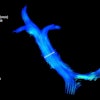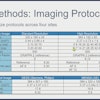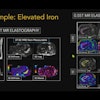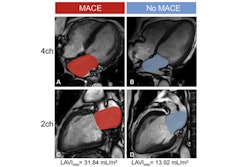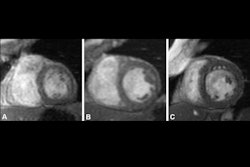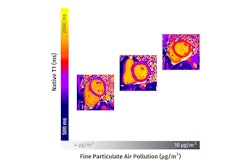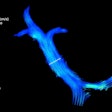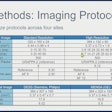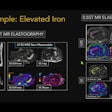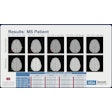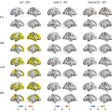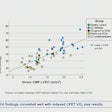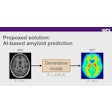HONOLULU – An AI image reconstruction technique can significantly improve acquisition times and image quality for cardiac MRI, according to research presented at the annual meeting of the International Society for Magnetic Resonance in Medicine (ISMRM).
The method also provides reliable assessments of cardiac function and tissue characteristics, according to presenter Yiying Hua, MD, of Fudan University in China.
“Our findings demonstrate that [the AI technique] has potential to become a promising alternative in clinical practice, facilitating more precise, more efficient, and patient-friendly cardiac imaging,” she said.
Cardiac MR is a crucial noninvasive imaging technique for diagnosing cardiac diseases, but it can take a long time to acquire. To address this problem, deep-learning reconstruction techniques have been developed to enhance image quality while reducing acquisition times, according to Yui.  Yiying Hua, MD, of Fudan University.
Yiying Hua, MD, of Fudan University.
The research team sought to assess the performance of a compressed-sensing AI algorithm for cardiac MRI (CSAI-CMR) by comparing its acquisition time, efficiency, and diagnostic value with standard sensitivity-encoding (SENSE) sequences. The study was conducted on 100 participants who received a clinically indicated MRI exam between March and August 2024 on an Ambition 1.5-tesla scanner (Philips). CSAI-MR and SENSE sequences were acquired in a single scanning procedure.
Image quality for both reconstruction techniques was assessed qualitatively by two readers using a five-point Likert scale. Next, the researchers quantitatively analyzed edge sharpness, functional parameters, as well as myocardial edema and fibrosis.
CSAI-CMR was 57.4% faster than SENSE and also produced sharper images, according to Yui.
Qualitative and quantitative performance of reconstruction techniques | ||
SENSE reconstruction | CSAI-CMR reconstruction | |
Mean acquisition time | 277.1 seconds | 159.2 seconds |
Mean overall image quality score | 3.91 | 4 |
Mean perceived signal-to-noise ratio score | 3.78 | 3.99 |
Mean image sharpness score | 3.82 | 4.05 |
Mean differences between cine measurements | 0.105 pixels | 0.141 pixels |
All differences were statistically significant at p < 0.001 with the exception of cine measurements (p < 0.05). There were no statistically significant differences for artifact scores or diagnostic confidence.
The researchers did not find any statistical difference in T2 signal-intensity ratio or late gadolinium enhancement percentage. In other findings, both reconstruction techniques yielded similar measurements for most cardiac function parameters, with the exception of left-ventricular end diastolic volume, left-ventricular stroke volume, and left-ventricular cardiac output.
“This suggests that CSAI-CMR can provide a reliable assessment of cardiac function,” she said.
The researchers acknowledged that the lack of pathological biopsy results as a reference standard poses certain limitations to the study results.
